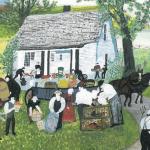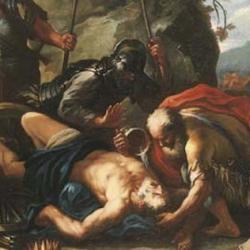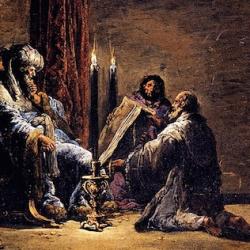Hezekiah’s Passover (2 Chronicles 30) has a prominent place in the Chronicler’s account of his reign. As William Johnstone points out (1 & 2 Chronicles), Hezekiah’s reign moves out from the temple to the city to the nations. He reopens and purifies the house of Yahweh (2 Chronicles 29), prepares the city for the celebration of Passover (2 Chronicles 30), and then gains a reputation among the nations because of his deliverance from Sennacherib (2 Chronicles 32).
To prepare for Passover, Hezekiah purges idols from the city of Jerusalem, as he had earlier purged the temple. The people remove altars and toss them into the Kidron Valley to the east of the city (2 Chronicles 30:14). Then they get down to business – slaughtering lambs, sprinkling blood, enjoying the festivity. They are so filled with joy that they celebrate a double Feast of Unleavened Bread, extending it from one to two weeks (30:23), with Hezekiah and his officials providing the bulls and sheep to keep the party going (30:24).
But there are glitches. They aren’t ready to celebrate on the fourteenth day of the first month, and so they back it up to the second month. That doesn’t violate Torah, though, since Numbers 9 provides for a second-month Passover for those who are unclean in the first month. Hezekiah applies the rule because the entire nation is unclean.
The other glitch is more serious, and has more interesting consequences. Hezekiah invites the northern tribes and many from Ephraim, Manasseh, Issachar, and Zebulun show up in Jerusalem (30:18). They’ve been worshiping golden calves and Baals for generations, and they haven’t purified themselves. Yet they eat the Passover anyway, “otherwise than written” (30:18).
It’s the sort of violation that the Chronicler highlights throughout his chronicle. It’s a ma’al, a sacrilege, an intrusion on God’s holiness, and in Chronicles a ma’al is usually followed by an outbreak of wrath. It doesn’t happen in this case, because Hezekiah intervenes and asks for “pardon” (Heb. kapar, root for kippur, “atonement” or “covering”). It’s a remarkable circumvention of normal procedure: Instead of going through a rite of covering/atonement, Hezekiah simply prays (30:18). As Yahweh promised Solomon (2 Chronicles 7:13-14), He hears and answers and “heals” (Heb. rapha’, used in 30:20) the people.
Perhaps even more remarkable is Hezekiah’s argument in favor of atonement: He asks Yahweh to cover “everyone who prepares his heart to seek God . . . though not according to the purification of the sanctuary” (30:19). “Seek” (Heb. darash) is a keyword throughout Chronicles. Good kings seek God; bad kings don’t. Seeking God in prayer and temple worship is just what Israel should be doing, but Hezekiah seems to take the heart-seeking as an adequate replacement for following purity regulations. It seems a complete “spiritualization” of temple worship; external rites are turned into interior preparation of the heart.
That is not an accurate conclusion. Hezekiah’s reference to preparation of the heart comes in a prayer for forgiveness and covering; their failure to prepare ritually is a violation that needs to be forgiven. Besides, Yahweh “heals” the people, suggesting that they are already suffering in some way. More generally, the whole point of the prayer is to enable the Israelites to participate in the Passover and Feast of Unleavened Bread in a state of impurity. Hezekiah doesn’t suggest that they can keep Passover by “feasting in their hearts.”
But this isn’t to minimize the significance of the incident.Royal prayer proves as effective as priestly ritual. Prayer can cover sin, and allow the unclean to join the celebration. It’s not a “spiritualization” of Israel’s worship, but it is a step toward worship in the new covenant mode, where prayer and praise are the fulfilled forms of sacrifice.
Once the Passover is completed, the people spread from Jerusalem (31:1). Reform radiates from the temple to the city to the land. And as soon as Hezekiah has completed that project, another challenge presents itself in the form of Assyrian invasion. Sennacherib besieges the city threatens to overthrow it.
Sennacherib insults Yahweh by comparing Him with the gods of the nations. His boasts are comically repetitive. No one can deliver, no one can deliver, no one can deliver, from my hand, my hand, my hand, my hand. He uses the phrase “from my hand” eight times, and then the Chronicler uses the same word in an aside: Sennacherib and his messengers “spoke of the God of Jerusalem as of the gods of the earth the work of man’s hands” (yadey ha’adam). Sennacherib’s hands are only as powerful as his gods, which are products of his own hands.
Yahweh’s victory is cartoonishly easy: He sends a messenger through the Assyrian camp and “destroyed every mighty warrior, commander and officer” (32:21). Yahweh doesn’t lift w finger, much less a hand. Sennacherib of the mighty hand slinks home to Nineveh, where he is killed by his own children in the house of his god. The hands of his god aren’t strong enough to save him.
It’s an exodus sequence: After the Passover of chapter 30, an “exodus” naturally follows, a miraculous deliverance from a more powerful Gentile king. It’s a conquest sequence: After purging the temple, city, and land of idols, Hezekiah naturally gains control of the land and wins the admiration and respect of the surrounding nations (32:23). This is how the Davidic king is exalted: By purgation of temple, city, and land, and by faithful prayer in the face of danger.















